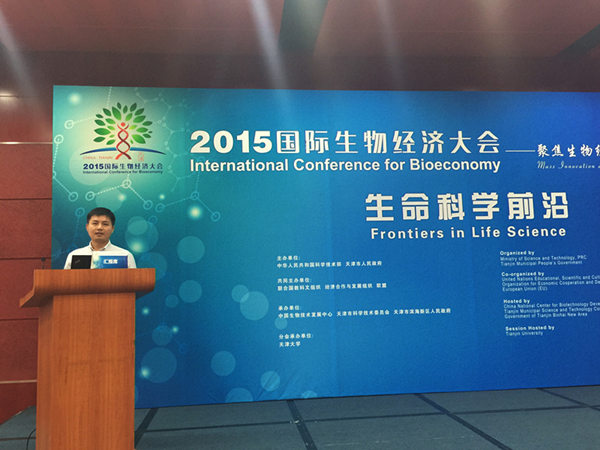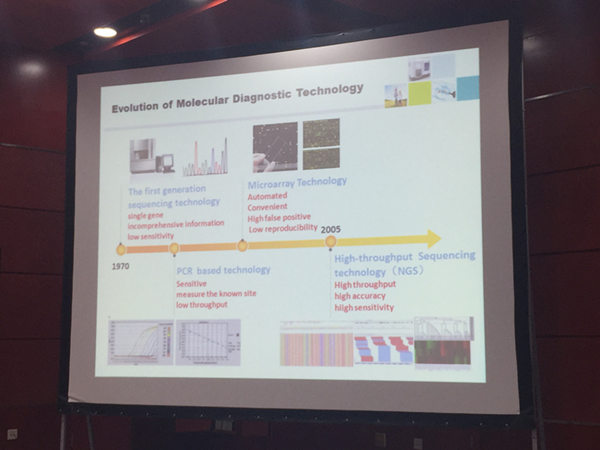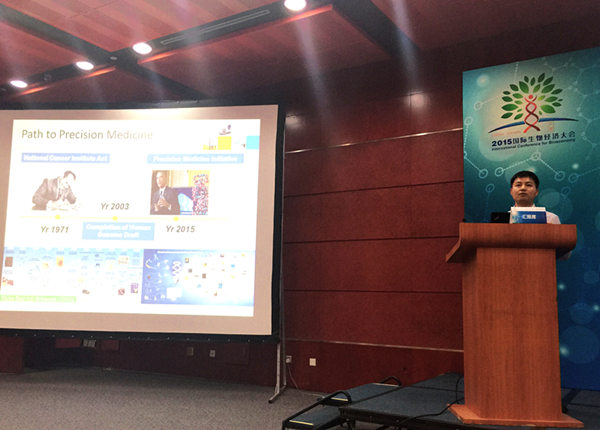Hosted by the Ministry of Science and Technology and the people's government of Tianjin, the "2015 International Conference for Bioeconomy" kicked off at Binhai International Convention Center on the morning of July 23. The conference is held every two years and is so far a professional event that is the most authoritative, highest in standard and level and attracts most attention in the field of bioeconomy of China. The conference was attended by experts from the circles of genetics, oncology and biology such as Academician Ding Jian, Academician Hou Yunde, Professor Barry Marshal, a Nobel Prize winner (University of Western Australia), Professor Mauro Giacca (director of International Center for Genetic Engineering and Biotechnology), Professor Ernst Wolvetang (University of Queensland). They had made wonderful speeches.
On the conference, Dr. Sheng Sitong, president of Shenzhen HYK High-throughput Biotechnology Research Institute and chief scientist of Shenzhen HYK Gene Technology Co., Ltd., gave a wonderful speech on related topics "How the precise molecular diagnosis is promoted by high-throughput gene sequencing technology and how to realize precision medicine".

Precision Medicine--Another Revolution in Medicine
How fast the medicine has developed? From the signing of cancer program by President Nixon in 1971 to the completion of the human's genome project around ten years ago, and then to today's precision medicine that is sweeping the world, it is a solid evidence for the rapid development of medicine. On January 20 this year, the US proposed a large medical research program of "precision medicine", which will invest 215 million US dollars into researches to collect the gene information of millions of volunteers as the objects of research. Meanwhile, China is also actively promoting the researches of precision medicine which is going from a concept into clinical application and the market.
The clinical application of high-throughput gene sequencing technology is increasingly mature
No doubt precise molecular diagnosis plays a vital role in precision medicine. Molecular diagnosis technology has witnessed the emerging of many conventional testing technologies such as PCR from the first generation of gene sequencing technology born in the 1870s to today's high-throughput gene sequencing technology (NGS). The emerging of high-throughput gene sequencing technology has solved existing problems of previous molecular diagnosis technologies in aspects such as flux, sensitiveness and accuracy.

Meanwhile, the high-throughput gene sequencing technology has also significantly reduced the costs for single nucleotide sequencing compared with that of the first generation of sequencing technology. Taking human's genome sequencing as an example, at the end of the last century the human's genome project cost 3 billion US dollars to decode the life code of human, whereas the rapid development of high-throughput gene sequencing technology has taken the human's genome sequencing into an era of a thousand (US) dollars. As an innovation to conventional modes of treatment and health management, the application scope of high-throughput gene sequencing technology is expanding, which has bred a huge market space.
In recent years, the tumor incidence has been rising continuously in China and has become a very serious issue of public health and the society. We are in an urgent need to challenge tumor. Then how can we realize early intervention and precision treatment for tumor?
Precision Medicine Boosted by High-throughput Gene Sequencing Technology
Dr. Sheng Sitong said, with the constant breakthroughs in high-throughput gene sequencing technology, its application in the field of clinical medicine has also been promoted rapidly. In 2014, related products of HYK high-throughput gene sequencing technology were granted with registration certificates for medical apparatus in succession, which enabled the technology to be applied clinically.

High-throughput gene sequencing technology can play an important role in the tertiary prevention of tumor and is the cornerstone for the realization of precision medicine clinically. In the primary prevention of tumor (prevention against pathogen), genetic background of individual genes can be acquired through the technology, so that the susceptibility degree of individuals to a disease can be identified. For example, BRCA1 and BRCA2 genes related with the hereditary breast/oval cancer syndrome (HBOC). The mutation status of the two genes of breast cancer patients or high risk groups are detected with the technology, which can accurately and comprehensively judge the gene mutation of the tested group and effectively guide the early intervention to tumor.
The secondary prevention of tumor ("Three Early" preventions) is extremely important for the selection of testing method. Gene mutation is earlier than protein mutation. In the "three early" preventions against tumor at the level of gene, the mutation of cancer gene or cancer suppressor gene can be used as related marker for tumor cancer. Free DNA in the blood of human is detected. The free DNA existing in the circulating blood of normal human is usually smaller than 10 ng·ml-1, which is very few. Therefore, it has a very high requirement on the sensitiveness, accuracy and specificity of testing technology. Relying on the feature of deep sequencing, the high-throughput gene sequencing technology can accurately and sensitively detect the trace amount of free DNA in the blood of human, thereby more effectively realize early discovery.
In the tertiary prevention of tumor (symptomatic and rehabilitation treatment), a more precise molecular sub-typing can be realized on tumor with the technology, so as to provide reference for developing a precise treatment plan for tumor patients. At present, the gene testing targeting precision medication abroad is inclined to test multi-gene panel related with the tumor. The application of high-throughput gene sequencing technology can effectively reduce the testing costs of a large number of samples and multiple genes, so as to benefit more tumor patients.
What's worth mentioning is that the research team led by Professor Wu Yilong of the Tumor Center of Guangdong People's Hospital has discovered that by detecting the mutation abundance of epidermal growth factor receptor (EGFR), it can predict the curative effect of treating NSCLC with EGFR-TKI. The higher the abundance is, the better the relative curative effect will be. The research has achieved a shift from qualitative focus to quantitative focus on the detection of EGFR mutation for the first time. The high-throughput gene sequencing technology can detect the mutation abundance. In the future, for patients with EGFR mutation, they can be further segmented based on the results of high-throughput gene sequencing. Based on the mutation abundance, it will be determined whether to use the targeted drug and develop a more precise individualized treatment scheme.
HYK Gene is the first specialized institution in China to own the new generation of high-throughput gene sequencing platform with independent intellectual property rights. The HYK-PSTAR-IIA high-throughput gene sequencer developed by it independently has passed the CFDA reviewing and obtained a "registration certificate for medical apparatus". Its high-throughput gene sequencing technology is also currently the only technology that can detect mutation abundance and has found extensive clinical applications among all clinical gene testing technologies.